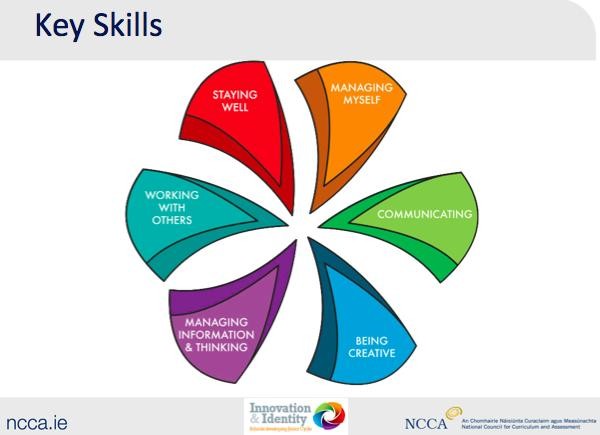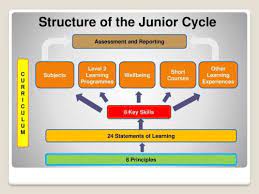Junior Cycle Information for Parents and Sample Classroom Based Assessments.

The new junior cycle features newly developed subjects and short courses, a focus on key skills, and new approaches to assessment and reporting.
The Framework for Junior Cycle, provides the basis for post-primary schools to plan quality, inclusive and relevant education programmes with improved learning experiences for all students, including those with special educational needs.
The Framework contains 24 statements of learning, underpinned by the eight principles, provide the basis for schools to plan for, design and evaluate their junior cycle programmes. That process of planning focuses on the combination of curriculum components (subjects, PLU’s, and short courses) and other learning experiences. Schools will ensure that all statements of learning, alongside the key skills feature in the programmes of all junior cycle students.
Eight principles underpin the Framework for Junior Cycle. These principles will inform the planning for as well as the development and the implementation of junior cycle programmes in all schools.
Learning to Learn
High quality curriculum, assessment, teaching and learning support students in developing greater independence in learning and in meeting the challenges of life beyond school, of further education, and of working life.
Choice and Flexibility
The school’s junior cycle programme is broad enough to offer a wide range of learning experiences to all, and flexible enough to offer choice to meet the needs of students.
Quality
All students experience a high quality education, characterised by high expectations of learners and the pursuit of excellence.
Creativity and innovation
Curriculum, assessment, teaching and learning provide opportunities for students to be creative and innovative.
Engagement and participation
The experience of curriculum, assessment, teaching and learning encourages participation, generates engagement and enthusiasm, and connects with life outside the school.
Continuity and development
Curriculum, assessment, teaching and learning enables students to build on their learning to date, recognises their progress in learning and supports their future learning.
Inclusive education
The educational experience is inclusive of all students and contributes to equality of opportunity, participation and outcomes for all.
Wellbeing
The student experience contributes directly to their physical, mental, emotional and social wellbeing and resilience. Learning takes place in a climate focused on collective wellbeing of school, community and society.
Junior Cycle Information for Parents and Samples of Classroom Based Assessments.
- Junior Cycle Information for Parents
- Junior Cycle Profile of Acheivement
- Second Year CBA Information for Parents
- Third Year CBA Information for Parents
- Key Dates for CBAs 2022-2023
- CBA - Fr. Denis O'Hara by Emma Maloney.
- CBA - History of St. Louis Community School by Caoimhe Walsh.
- CBA - A Past in my Place by Liam Smyth.


